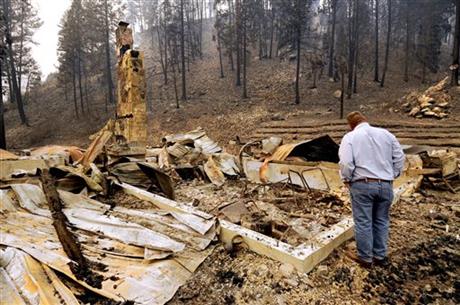
By GOSIA WOZNIACKI
U.S. Sen. Jon Tester, D-Mont., looks at the remains of a Lolo Creek home that was destroyed by the West Fork II fire when it swept down the Lolo Creek canyon, Wednesday, Aug. 21, 2013 near Lolo, Mont. The fire burned four other homes as well along the U.S. Highway 12 corridor. (AP Photo/Missoulian, Kurt Wilson)
FRESNO, Calif. (AP) — A wildfire outside Yosemite National Park — one of 50 major brush blazes burning across the western U.S. — more than tripled in size overnight and still threatens about 2,500 homes, hotels and camp buildings.
Fire officials said the blaze burning in remote, steep terrain had grown to more than 84 square miles and was only 2 percent contained on Thursday, down from 5 percent a day earlier.
The fire has destroyed two homes and seven outbuildings and led to the voluntary evacuation of the gated summer community of Pine Mountain Lake, which has a population of 2,800.
Several organized camps and at least two campgrounds have been evacuated since the fire broke out Saturday.
The fire also caused the closure of a 4-mile stretch of State Route 120, one main path into Yosemite on the west side. The park remains open and can be accessed via state Routes 140 and 41 and State Route 120 from the east side.
“This is typically a very busy time for us until Labor Day, so it’s definitely affecting business not having the traffic come through to Yosemite,” said Britney Sorsdahl, a manager at the Iron Door Saloon and Grill in Groveland, a community of about 600 about 5 miles from the fire.
The board of supervisors in Tuolumne County held an emergency meeting and voted for a resolution asking Gov. Jerry Brown to declare a state of emergency and free funds for the firefight.
The resolution said the fire was “directly threatening” communities and “beyond our capabilities,” according to the Modesto Bee.
The fire was among 50 major uncontained wildfires burning throughout the West, according to the National Interagency Fire Center in Boise, Idaho, including in California, Alaska, Arizona, Idaho, Montana, Nevada, Oregon, Utah, Washington and Wyoming. More than 19,000 firefighters were fighting the fires.
But the U.S. Forest Service, the nation’s top wildfire-fighting agency, said Wednesday that it is running out of money to fight wildfires and is diverting $600 million from timber, recreation and other areas to fill the gap. The agency said it had spent $967 million so far this year and was down to $50 million — typically enough to pay for just a few days of fighting fires when the nation is at its top wildfire preparedness level, which went into effect Tuesday.
There have been more than 32,000 fires this year that have burned more than 5,300 square miles.
On Wednesday, the National Interagency Fire Center listed two fires in Montana as the nation’s number one priority. They include a wildfire burning west of Missoula that has surpassed 13 square miles, destroyed five homes, closed U.S. Highway 12 and led to multiple evacuations. The Lolo Fire Complex, which was zero percent contained, also destroyed an unknown number of outbuildings and vehicles.
At least 19 other notable fires were burning across the state, leading Montana Gov. Steve Bullock to declare a state of emergency, which allows the use of National Guard resources ranging from personnel to helicopters.
In Oregon, a fire in the Columbia Gorge about 10 miles southwest of The Dalles grew to 13 square miles, burning a fourth home. The fire was 15 percent contained. Strong winds continued to fan the blaze, pushing it into the Mount Hood National Forest.
Firefighters in southwestern Oregon braced for a return of lightning storms that started a series of fires last month that continue to burn in rugged timberlands.
In Idaho, progress was reported in the fight against the nearly 169-square-mile Beaver Creek fire, which forced the evacuation of 1,250 homes in the resort area of Ketchum and Sun Valley. That fire was 47 percent contained, authorities said.
In Yellowstone National Park in Wyoming, officials reopened a 7-mile section of road closed briefly by a wildfire. As of Wednesday, the Alum Fire had burned about 12 square miles and was spreading slowly, leading park officials to make preliminary evacuation plans for a community on the shore of Yellowstone Lake.
___
AP writers Jeff Barnard in Grants Pass, Ore., Matt Volz in Helena, Mont., and Mead Gruver in Cheyenne, Wyo. contributed to this report.



